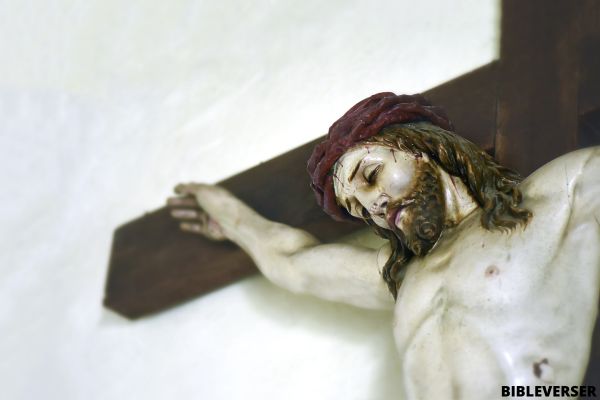Spiritual Meaning of the Cross
The Cross symbolizes more than just the physical structure on which Jesus was crucified; it represents the intersection of God’s love and justice, mercy and judgment, sacrifice and victory. It is the ultimate expression of God’s love for humanity and His plan for redemption.
Sacrifice and Atonement: The Cross represents the ultimate sacrifice made by Jesus Christ for the atonement of sins. He took upon Himself the punishment that we deserved, offering His life as a substitute so that we might be reconciled to God. This act of atonement is central to the Christian understanding of salvation.
Redemption and Forgiveness: The Cross is where redemption and forgiveness are made possible. Jesus’ death paid the price for our sins, redeeming us from the bondage of sin and granting us forgiveness. The Cross is a symbol of God’s grace, where the debt of sin is paid in full.
Reconciliation with God: Through the Cross, the broken relationship between humanity and God is restored. Sin had separated us from God, but through Jesus’ death, we are reconciled and brought back into fellowship with Him. The Cross is the bridge that connects us to God.
Victory over Sin and Death: The Cross is not only a symbol of suffering but also of victory. Through His death and resurrection, Jesus conquered sin and death, providing a way for us to live in freedom and hope. The Cross signifies the triumph of good over evil, life over death.
The Power Behind the Cross
The power of the Cross lies in what it accomplished and what it continues to represent for believers:
The Power of Salvation: The Cross is the means through which salvation is made possible. As Paul writes in 1 Corinthians 1:18, “For the message of the cross is foolishness to those who are perishing, but to us who are being saved it is the power of God.” It is through the Cross that we receive the gift of eternal life.
The Power of Transformation: The Cross has the power to transform lives. It calls us to die to our old selves and to be born again into new life in Christ. This transformation is ongoing, as we daily take up our cross and follow Jesus, becoming more like Him in character and actions.
The Power of Healing: By His wounds, we are healed (Isaiah 53:5). The Cross holds the power to bring healing—physical, emotional, and spiritual. It is a source of restoration, where what is broken is made whole.
The Power of Reconciliation: The Cross reconciles not only us to God but also us to one another. It breaks down the barriers of hostility and division, calling us to live in unity and peace with others.
The Seven Things That Happened on the Cross
The events surrounding the crucifixion of Jesus are filled with deep spiritual significance. Here are seven key things that happened on the Cross:
Jesus’ Words of Forgiveness: “Father, forgive them, for they do not know what they are doing” (Luke 23:34). Jesus’ first words on the Cross express forgiveness, even to those who were crucifying Him. This highlights the boundless mercy and love of God.
Promise of Paradise: To the repentant thief beside Him, Jesus said, “Truly I tell you, today you will be with me in paradise” (Luke 23:43). This shows the immediacy of salvation and the assurance of eternal life for those who believe in Him.
Jesus’ Provision for His Mother: Jesus ensured His mother would be cared for by entrusting her to the Apostle John (John 19:26-27). This act demonstrates Jesus’ compassion and concern for the well-being of others, even in His moment of suffering.
Jesus’ Cry of Forsakenness: “My God, my God, why have you forsaken me?” (Matthew 27:46). This cry reflects the spiritual anguish Jesus experienced as He bore the sin of the world, experiencing separation from the Father.
Jesus’ Expression of Thirst: “I am thirsty” (John 19:28). This statement fulfills Scripture and also reminds us of Jesus’ humanity, showing that He endured physical suffering just as we do.
Jesus’ Declaration of Completion: “It is finished” (John 19:30). This powerful declaration signifies that Jesus’ work of salvation was complete. The debt of sin was paid, and the way to God was opened.
Jesus’ Final Commendation: “Father, into your hands I commit my spirit” (Luke 23:46). In His final moments, Jesus entrusted Himself to the Father, showing His total submission and trust in God’s plan.
The Seven Lessons of the Cross
From these events and the broader narrative of the crucifixion, we can draw seven essential lessons:
The Power of Forgiveness: The Cross teaches us that forgiveness is central to the Christian life. If Jesus can forgive those who crucified Him, we too are called to forgive those who wrong us.
The Assurance of Salvation: The Cross assures us that salvation is available to all who believe. It is never too late to turn to Christ, as shown by the thief on the cross.
The Importance of Compassion: Even in His suffering, Jesus cared for others, reminding us to look beyond our circumstances and show compassion to those around us.
The Reality of Spiritual Suffering: Jesus’ cry of forsakenness teaches us that spiritual suffering is real, but it also reminds us that God is present even when we feel most alone.
The Fulfillment of Scripture: Jesus’ thirst on the Cross shows that His life and death were the fulfillment of God’s plan as revealed in Scripture, reinforcing the trustworthiness of God’s Word.
The Finality of Jesus’ Work: “It is finished” teaches us that Jesus’ sacrifice was complete and sufficient. Nothing more is needed for our salvation; it is a gift of grace.
The Call to Trust in God: Jesus’ final words remind us to place our trust in God, even in the face of death, knowing that He is faithful and in control.
The Benefits of the Cross in the Bible
The Bible outlines numerous benefits of the Cross for believers:
Salvation: Through the Cross, we receive the gift of eternal life (John 3:16).
Forgiveness: Our sins are forgiven, and we are cleansed by the blood of Jesus (Ephesians 1:7).
Redemption: We are redeemed from the curse of the law and the bondage of sin (Galatians 3:13).
Reconciliation: We are reconciled to God, restoring our relationship with Him (2 Corinthians 5:18-19).
Victory Over Sin and Death: The Cross gives us victory over the power of sin and the fear of death (1 Corinthians 15:55-57).
Healing: By His wounds, we are healed—physically, emotionally, and spiritually (Isaiah 53:5).
New Life: The Cross gives us new life in Christ, transforming us into new creations (2 Corinthians 5:17).
God’s Purpose of the Cross
God’s purpose in the Cross was multifaceted, aiming to address the deepest needs of humanity and fulfill His plan for salvation:
To Demonstrate His Love: The Cross is the ultimate demonstration of God’s love for us. Romans 5:8 says, “But God demonstrates his own love for us in this: While we were still sinners, Christ died for us.”
To Satisfy Divine Justice: The Cross satisfied the justice of God, dealing with sin in a way that was just and merciful. Jesus bore the penalty of our sins so that we could be declared righteous.
To Provide a Way of Salvation: The Cross is the means by which God provided a way for humanity to be saved. Through Jesus’ sacrifice, the way to eternal life is opened to all who believe.
To Defeat the Powers of Darkness: Through the Cross, Jesus disarmed the powers and authorities, triumphing over them and breaking the hold of Satan on humanity.
To Reconcile Humanity to God: The Cross restores the relationship between God and humanity, bringing peace where there was once enmity.
Does the Cross Hold Power?
Yes, the Cross holds immense power. It is not just a historical event or a symbol but a powerful reality that impacts every aspect of a believer’s life. The power of the Cross lies in what it accomplished—salvation, forgiveness, redemption, and victory. It is through the Cross that we are brought into a right relationship with God and given the power to live transformed lives.
The Cross continues to hold power because it is the foundation of our faith. It is the source of our hope and the assurance of God’s love and grace. The Cross empowers us to live in freedom, to overcome sin, and to walk in the newness of life that Christ offers.
Lessons We Can Learn from the Cross
The Cross of Jesus Christ is rich with spiritual significance and profound lessons that continue to shape and transform the lives of believers. Here are some key lessons we can learn from the Cross:
1. The Depth of God’s Love
The Cross is the ultimate expression of God’s love for humanity. Jesus’ sacrifice shows us just how far God was willing to go to redeem us from sin. The Bible says, “For God so loved the world that He gave His one and only Son, that whoever believes in Him shall not perish but have eternal life” (John 3:16). The Cross teaches us that God’s love is unconditional, sacrificial, and far beyond our understanding.
2. The Seriousness of Sin
The Cross reveals the seriousness of sin and its consequences. Sin separates us from God and leads to death. The fact that Jesus had to suffer and die to atone for our sins shows just how grave sin is in the eyes of a holy and just God. This realization should lead us to a deeper awareness of our sinfulness and a greater appreciation for God’s grace.
3. The Necessity of Sacrifice
Jesus’ death on the Cross was the ultimate sacrifice, demonstrating that true love often requires sacrifice. The Cross teaches us that following Christ may require us to lay down our own desires, comforts, and even our lives for the sake of others and for the glory of God. It’s a call to live a life of self-denial, putting God and others before ourselves.
4. The Power of Forgiveness
One of the most powerful lessons from the Cross is the importance of forgiveness. Jesus prayed for those who crucified Him, saying, “Father, forgive them, for they do not know what they are doing” (Luke 23:34). This teaches us that forgiveness is not optional for believers. We are called to forgive others just as Christ forgave us, even when it’s difficult or painful.
5. The Hope of Redemption
The Cross is not just a symbol of suffering but also of redemption and hope. Jesus’ death and resurrection opened the way for us to be redeemed from sin and restored to a right relationship with God. The Cross teaches us that no matter how broken or lost we are, there is always hope for redemption through Jesus Christ.
6. The Call to Discipleship
Jesus said, “Whoever wants to be my disciple must deny themselves and take up their cross daily and follow me” (Luke 9:23). The Cross is a call to discipleship—a call to follow Jesus with commitment and obedience, even when it’s difficult. It’s a reminder that being a disciple of Christ involves taking up our own cross, enduring hardships, and remaining faithful to God’s will.
7. The Victory Over Death and Evil
The Cross teaches us that what appears to be a moment of defeat can actually be a moment of victory. Jesus’ crucifixion seemed like a victory for His enemies, but it was through the Cross that He triumphed over sin, death, and the powers of evil. This teaches us to trust in God’s plan, even when we don’t understand it, and to have faith that He can bring victory out of seeming defeat.
8. The Fulfillment of God’s Promises
The events of the Cross fulfilled numerous prophecies and promises made throughout Scripture. This teaches us that God is faithful and His promises are sure. The Cross assures us that God’s word can be trusted, and that He will fulfill all He has promised, including the promise of eternal life for those who believe in Christ.
9. The Example of Humility
Philippians 2:8 says that Jesus “humbled Himself by becoming obedient to death—even death on a cross!” The Cross is the ultimate example of humility. Jesus, who was in the form of God, did not consider equality with God something to be used to His own advantage, but He humbled Himself for our sake. This teaches us to live with humility, putting others before ourselves and serving without seeking recognition.
10. The Importance of Obedience to God’s Will
Jesus’ journey to the Cross was marked by His obedience to the Father’s will, even though it meant enduring great suffering. In the Garden of Gethsemane, He prayed, “Not my will, but yours be done” (Luke 22:42). This teaches us the importance of surrendering our will to God’s will, trusting that His plans are perfect, even when they involve hardship.
11. The Necessity of Faith
The Cross calls us to live by faith. When we look at the Cross, we are reminded that our salvation is not based on our works but on our faith in Jesus Christ and His finished work on Calvary. This teaches us to rely on God’s grace and to trust in Him completely, knowing that He has already accomplished what is necessary for our salvation.
12. The Call to Share in Christ’s Suffering
The Cross reminds us that as followers of Christ, we may be called to share in His suffering. Paul writes in Philippians 3:10, “I want to know Christ—yes, to know the power of his resurrection and participation in his sufferings, becoming like him in his death.” The Cross teaches us that suffering is a part of the Christian journey, but it also draws us closer to Christ and conforms us to His image.
13. The Unity of Believers
The Cross breaks down barriers and unites all believers as one body in Christ. Galatians 3:28 says, “There is neither Jew nor Gentile, neither slave nor free, nor is there male and female, for you are all one in Christ Jesus.” The Cross teaches us that in Christ, we are all equal and united, regardless of our backgrounds, and we are called to live in unity and love with one another.
14. The Call to Serve
Jesus’ sacrifice on the Cross is the ultimate act of service. He came “not to be served, but to serve, and to give his life as a ransom for many” (Matthew 20:28). The Cross teaches us that we are called to serve others selflessly, just as Christ served us, and to live a life that reflects His love and humility.







